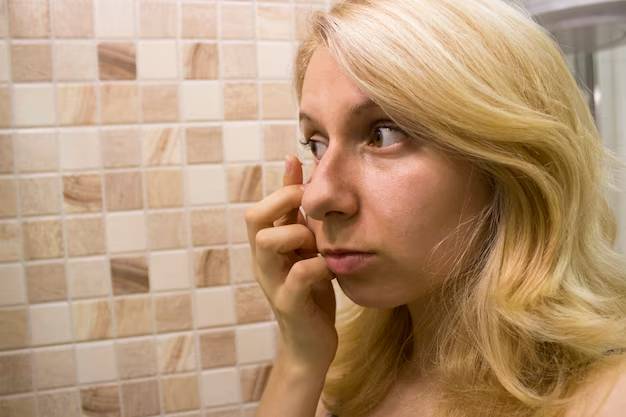Understanding Rosacea: Can It Truly Disappear for Good?
Rosacea, often characterized by persistent facial redness, visible blood vessels, and sometimes acne-like bumps, is more than just a cosmetic nuisance. It's a chronic skin condition that affects millions worldwide. Despite its commonality, many people find themselves asking, "Can rosacea truly go away?" Let's explore this question from multiple angles, offering insights that empower you to understand your options and navigate this condition thoughtfully.
What is Rosacea?
The Basics of Rosacea
Rosacea is a chronic skin condition that usually targets the face. It tends to appear in cycles, meaning it may flare up for a few weeks, subside, and then return. The symptoms vary significantly from person to person and may include:
- Persistent facial redness
- Swollen red bumps
- Visible blood vessels
- Eye irritation or swollen eyelids
- Thickened skin (especially around the nose)
These symptoms can vary in severity and sometimes extend beyond the face.
Who is Affected by Rosacea?
While rosacea can occur in anyone, it often affects adults between 30 and 60 years old. Those with fair skin who blush easily may be more susceptible, and it is slightly more common in women, particularly during menopause. However, men with rosacea often experience more severe symptoms.
Can Rosacea Go Away On Its Own?
The Nature of Chronic Conditions
Rosacea is considered a chronic condition. This means it often persists over time and may require long-term management. The idea that rosacea will simply disappear on its own is generally unlikely. Unlike some other skin conditions which may clear up over time, rosacea typically needs some form of intervention to manage or reduce its symptoms.
Remission VS Cure
It's important to differentiate between remission and a cure. Rosacea can go into remission, meaning the symptoms become less noticeable or vanish for a period. However, this does not mean it's cured. External factors or changes in lifestyle can trigger a relapse.
Managing Rosacea for Better Outcomes
Identifying Triggers
A significant part of managing rosacea involves identifying and avoiding personal triggers, which can include:
- Environmental Factors: Sunlight, wind, or extreme temperatures.
- Dietary Influences: Spicy foods, alcohol, and hot beverages.
- Lifestyle Choices: Stress, strenuous exercise, and certain cosmetic products.
Keeping a diary to track flare-ups alongside lifestyle habits can help pinpoint and subsequently avoid triggers.
Treatment Options
Although rosacea cannot be cured, many treatment options can make a significant difference:
- Topical Treatments: These can reduce inflammation and redness.
- Oral Medications: Antibiotics may help, particularly if acne-like bumps are present.
- Laser Therapy: Designed to reduce the appearance of blood vessels.
- Skin Care Routines: Using gentle, non-irritating skin care products can help reduce flare-ups.
Each treatment plan should be tailored to individual symptoms and triggers, often requiring a combination approach.
Lifestyle Adjustments and Self-Care
The Role of Skincare
A gentle skincare routine can help manage symptoms effectively. This includes:
- Using a mild, fragrance-free cleanser.
- Applying high SPF sunscreen daily.
- Moisturizing regularly to prevent skin dryness.
Stress Reduction Techniques
Stress is a prominent trigger for many rosacea sufferers. Incorporating stress-reducing techniques can be beneficial:
- Mindfulness and Meditation: Regular practice can ease stress and associated flare-ups.
- Exercise: Moderate activities that do not induce flushing.
- Adequate Sleep: Maintaining a sleep routine supports overall skin health.
What to Expect Over Time
The Long-Term Outlook
Rosacea is manageable, although individuals must often be vigilant about avoiding triggers and adhering to treatment protocols. With the right strategies, many find they can maintain a good quality of life without daily flare-ups affecting their confidence or comfort.
Seeking Professional Help
If symptoms persist despite self-care efforts, it might be beneficial to consult with a dermatologist. They can provide personalized advice and check for any underlying conditions that might exacerbate rosacea symptoms.
Final Insights: Taking Control of Rosacea
Understanding rosacea and its long-term nature empowers individuals to make informed decisions about managing it. While it may not "go away" in the traditional sense, with careful management and lifestyle adjustments, many people can achieve periods of remission, leading to clearer and more comfortable skin.
Quick Recap: Rosacea Management Tips
- 🌞 Know Your Triggers: Identify and avoid common culprits such as stress, spicy foods, and extreme weather.
- 💧 Gentle Skincare: Use mild products suited for sensitive skin and apply sunscreen daily.
- 💊 Consider Treatment Options: Topical treatments, oral medications, and laser therapy can help manage symptoms.
- 🧘♀️ Stress Management: Regular mindfulness practices and moderate exercise can reduce flare-ups.
- 📆 Track Your Progress: Maintain a skin diary to monitor symptoms and triggers over time.
Empowered with the right knowledge and tools, managing rosacea can become a much less daunting task.

